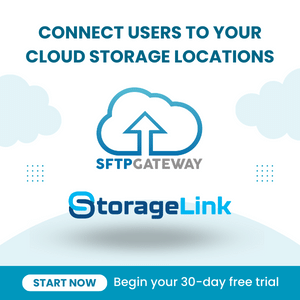Release Notes
Version 1.001.00
Breaking API Changes
- The /token/revoke endpoint is replaced with /logout, which does not need the token as a parameter
- The /login endpoint no longer needs to specify a 'scope' value
- The OIDC login process now delivers a Single-use token to the front-end when OIDC login completes. The single use token is posted to the /login endpoint as a code parameter with a grant_type of 'urn:ietf:params:oauth:grant-type:single-use-auth' which returns a usable hybrid token. This change was made to ensure possibly leaked token values through query string parameters would not give an attacker access to an account.
Feature Updates
- Pre-calculate user permissions and cloud connections to improve SFTP user connection speed
- Add field to Azure Cloud Connections to configure if HNS is enabled or not
- Increase max memory size for backend Java jar based on memory size of instance
- Upgrade Google Cloud SQL Proxy to v2 to support PSC to connect to database
- Remove network calls from instance boot to support starting instances in networks with no egress
Bug Fixes
- Fix issue with failing to upload files larger than 50GB to AWS
- Limit OIDC “prompt” query string parameter to Google Identity Providers (fixes OIDC to providers like Ping that do not support that parameter)
- Correct encoding of slashes in the base prefix for the Resolved Cloud Path for Azure Cloud Connections
- Ensure no connection errors when uploading more than 500 simultaneous files
- Pre-calculate user permissions and cloud connections to address bug where having many cloud connections could result in a database timeout
- Disable password expiration after a year on Linux root account
- Show and allow navigation to folders that have a blank name
- Removes automatic determination of HNS enablement on Azure Storage Accounts because it failed when using a System Assigned Identity. HNS is now specified when creating/editing Azure Cloud Connection.
- Importing a backup file with unsupported characters will now show errors with the line numbers of the unsupported characters
Other
- Update Java version from 11 to 17
- Update Spring Security from 5 to 6
- Update Spring Boot from 2 to 3
Version 1.000.03
Bugs
- Corrects the code that was preventing the deletion of folders.
- Conditionally utilize the select_account parameter when interacting with identity providers to enable support for Ping
Version 1.000.02
Security
- Update SnakeYaml to v2.x to resolve CVE-2022-1471
Features
- Users that were automatically provisioned by OIDC login will now have a note indicating the provisioning
- Responsive sizing for file list and buttons to display well on small screens
Bugs
- Downloading a file name with spaces will no longer replace spaces with +
- Users that signed in via an Identity Provider will not be presented with the option to change their password
- Long folder and file names will no longer cause a horizontal scrollbar
Version 1.000.00
Files and Folders
- Read and write directly to Cloud Storage, using the HTTPS protocol
- Configure folder permissions with List, Download, Upload and Delete/Overwrite
- Map an Web User Home Folder to an Cloud Storage location
- Folder mapping lets you configure a common scenario where an internal Web user has read/write access to external Web users' data, while external users cannot see each other's data
Web accounts
- Authenticate Web users with passwords or Identity Providers such as Cognito, Azure Active Directory or Google
- Adds password complexity requirements
Web administration
- Supports multiple Web Admin accounts
- Authenticate Web Admins with passwords or Identity Providers such as Cognito, Azure Active Directory or Google
- Simplifies first-time setup, which can be done entirely from the Web Admin Interface (no command line required)
- Imports Folders, Users and Settings via a migration process
Security
- Use instance profile permissions or configure credentials for each Cloud Storage location.
Performance and maintenance
- Improves performance and scalability through the use of the AWS/Azure/GCS SDK for Java
- Uses Postgres instead of LDAP, for easier maintenance
Cost
- Software charge of 8 cents USD per hour
- 30-day free trial
